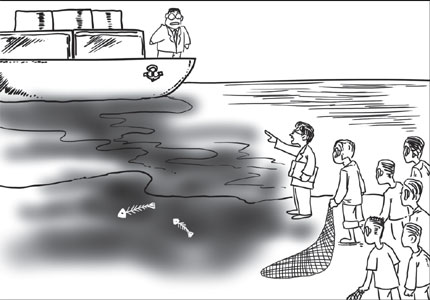Lawsuits in the public interest
 0 Comment(s)
0 Comment(s) Print
Print E-mail
Xinhua, October 26, 2011
E-mail
Xinhua, October 26, 2011
|
|
|
[By Zhou Tao/Shanghai Daily] |
Legislators this week will discuss a proposed change in the law that would make it easier to file lawsuits against those involved in environmental and food safety scandals.
A draft of the proposed new legislation was filed Monday, the first day of the bi-monthly meeting of the National People's Congress (NPC) Standing Committee. It will be discussed before the session ends Saturday.
The "public interest litigation," designed to deal with large-scale violations of the public interest, would allow government and non-government organizations to take big businesses to court on behalf of individuals or small groups of citizens.
It comes in the wake of several pollution and food safety incidents in China. Earlier this month, Wal-Mart was fined for mislabeling ordinary pork as "organic pork" in a number of its outlets in southwest China's Chongqing municipality.
A number of lawmakers and related authorities have stated that public interest litigation is needed to cope with environmental pollution and food safety issues.
Under the current civil procedure law, plaintiffs are restricted to citizens, corporations and organizations whose interests are directly related to the case.
In many cases, such as pollution compensation, individual victims often lack resources and find it hard to collect evidence and start proceedings, preventing them from taking polluters to court. Environmental organizations, which are often more willing to sue, face legal barriers in filing lawsuits in the public interest.
About 80 to 90 percent of public interest litigation cases filed by environmental organizations have failed mainly because the courts did not consider them to be qualified as plaintiffs, said Xu Xin, a professor from the Law School of the Beijing Institute of Technology. If public interest litigation is adopted, more polluters might be taken to court and victims may be better compensated, he said.
Too general
However, lawyers engaged in similar litigation have argued that draft is too general and might not be applicable in legal practice. The draft should clearly define which organizations are entitled to file public interest suits, said Li Gang, a Beijing-based lawyer who helps to run a non-governmental group advocating public interest litigation.
He suggested that ordinary citizens could also be plaintiffs in public interest litigation, which could be a good way for citizens to take part in governance.
Li's group is now working to help fishermen living near Bohai Bay file suit seeking compensation for lost business caused by to oil spills that occurred in June at an oil platform owned by the China National Offshore Oil Corporation (CNOOC) and operated by US-based oil giant ConocoPhillips.
"We have had more than 100 clients. But the proceedings will be very difficult. We do hope the amendment to the civil procedure law will give us some help," Li said.
Several non-governmental organizations have been working to help fishermen file a class-action lawsuit.
The draft would also allow the public to refer to court verdicts, except those containing confidential state and business information. Provisions in the draft would improve the supervision of civil lawsuit proceedings.
Under the current law, prosecutors can lodge a protest against civil court judgments. The draft law allows them to request a retrial. According to the draft, prosecutors are entitled to supervise not only court verdicts, but also the implementation of the verdicts.
In addition, the draft tightens penalties on individuals and corporations who refuse to follow court judgments. According to the draft, the maximum fine on individuals would be increased from 10,000 yuan (around US$1,500) to 100,000 yuan.
The minimum fine on corporations would be increased from 10,000 yuan to 50,000 yuan, while the maximum fine would be increased from 300,000 yuan to 1 million yuan.







Go to Forum >>0 Comment(s)